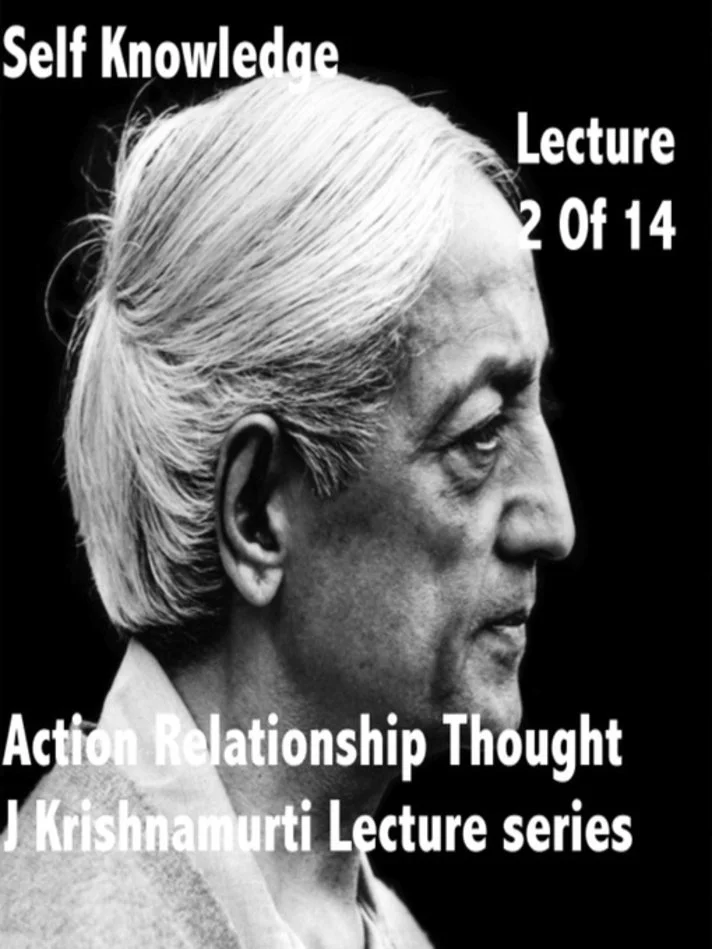Lecture 2 of 14: Listening to Jiddu Krishnamurti
Today, I finished listening to Lecture 2: Action, Relationship, Thought. In this lecture, Jiddu Krishnamurti begins with the concept of listening: to listen without accepting, without rejecting. To hear without the constant ‘hum’ of agreement or denial shaping what reaches you. In other words, listen without judgment. It sounds simple, isn’t it? But it’s not.
He speaks of our obsession with movement: We seem to be so engrossed in doing things. We are so restless, so consumed with doing something at any cost—getting on, achieving success. He calls this “activity.” And then there is “action.” Action, he says, is immediate, spontaneous, direct—without the process of thought involved.
I struggled a little with the last part, but it made me think. What does “without the process of thought involved” mean? We are trained to value “thinking things through” as responsible and rational, and in many contexts, it is. Here, though, I believe what Krishnamurti distinguishes is between technical thought (needed for daily tasks) and psychological thought (our projections, judgments, fears). He argues that in matters of living (love, relationships, morality), true action cannot emerge from the clutter of psychological thought. It comes from direct, clear perception. I want to unpack this a bit more.
Thought is memory: For Krishnamurti, thought is always the product of the past. It’s based on previous experiences, knowledge, and conditioning. When thought dominates action, we are essentially reacting, not acting—we’re replaying old patterns.
Action without thought is unconditioned: Immediate, spontaneous action arises from direct perception of “what is” in the moment, not from what “should be” or “has been.” For example, if a child runs into the street, you act. You don’t think through the pros and cons before pulling them back—that’s action free of the interference of thought.
Thought can distort action: When we filter every decision through memory, fear, desire, or expectation, our actions are often hesitant, biased, or self-serving. Krishnamurti suggests there is a different quality of action when the mind is quiet and fully attentive to the present.
So, when he says “action is immediate, spontaneous, direct—without the process of thought involved,” I believe he isn’t dismissing reason or planning in practical matters (like building a house, solving a math problem, or preparing a meal). Instead, he’s pointing to a deeper kind of action: free, unconditioned, and not rooted in the past.
This means that the quality of everything we do—how we act, how we relate, how we think—depends on whether we are seeing ourselves and life as they truly are, or through the lens of our conditioning. When we act without self-knowledge, our actions are shaped by hidden fears, desires, and motives.
The same is true for relationship. Without self-knowledge, we approach others with demands: to make us feel safe, valued, loved. These unspoken expectations distort connection, turning it into transaction. But when we see these tendencies in ourselves, without denial, we can meet others openly, not as extensions of our needs, but as they are.
Thought, too, becomes freer. Normally, thought is bound to memory, replaying the old. When we understand this, thought finds its right place: a useful tool for practical living, not the dictator of our inner life. In this freedom, there is space for something new to emerge. Space for insight, creativity and love.
My Reflection:
Freedom in action, relationship, and thought begins with self-knowledge.
Self-knowledge is understanding ourselves as we are (not by changing the world or suppressing ourselves).
—
From today until the end of September, I plan to listen to a series of lectures given by Jiddu Krishnamurti in 1949 to an audience in Ojai, California. These lectures—14 of them—are digitally remastered recordings available in an audiobook collection from NLB.
Related posts:
